牛津译林版八年级上册Unit 4 Do it yourself grammar课件(29张ppt)
文档属性
| 名称 | 牛津译林版八年级上册Unit 4 Do it yourself grammar课件(29张ppt) | 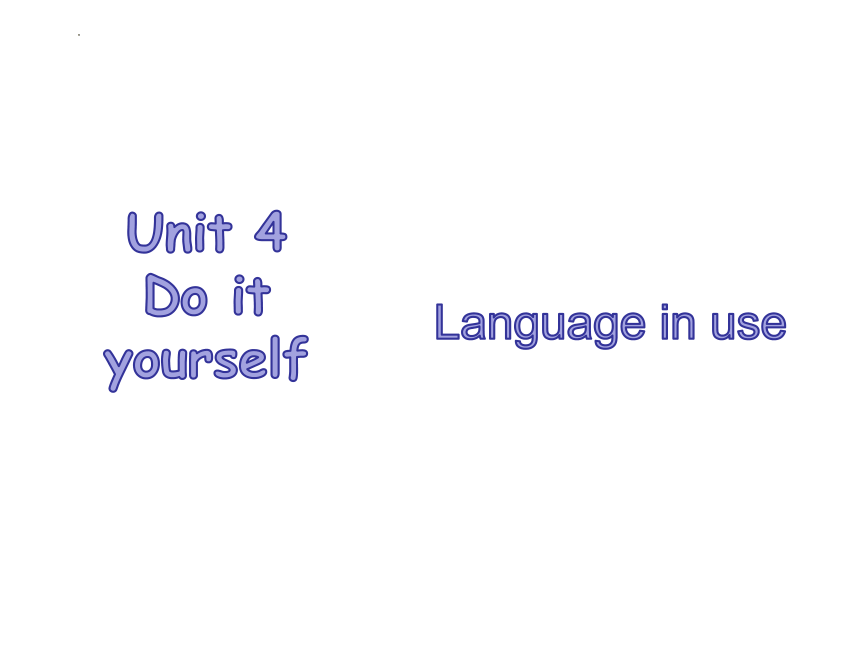 | |
| 格式 | pptx | ||
| 文件大小 | 626.2KB | ||
| 资源类型 | 教案 | ||
| 版本资源 | 牛津译林版 | ||
| 科目 | 英语 | ||
| 更新时间 | 2022-09-11 15:30:16 | ||
图片预览

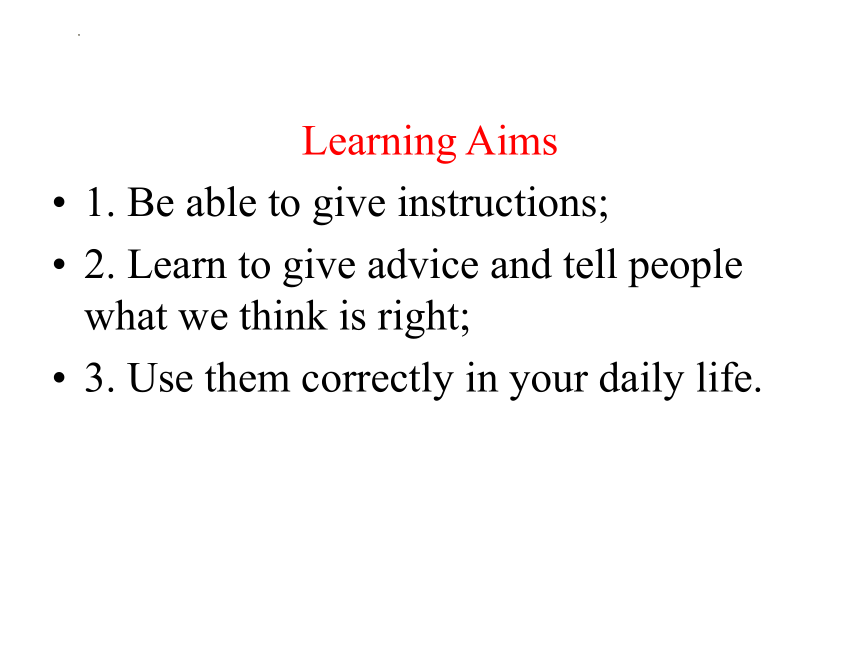


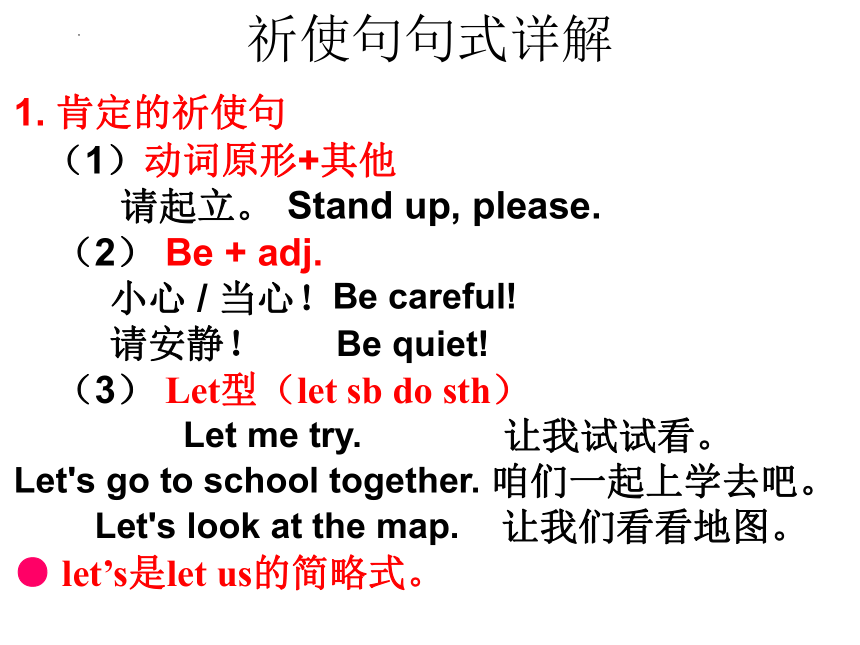
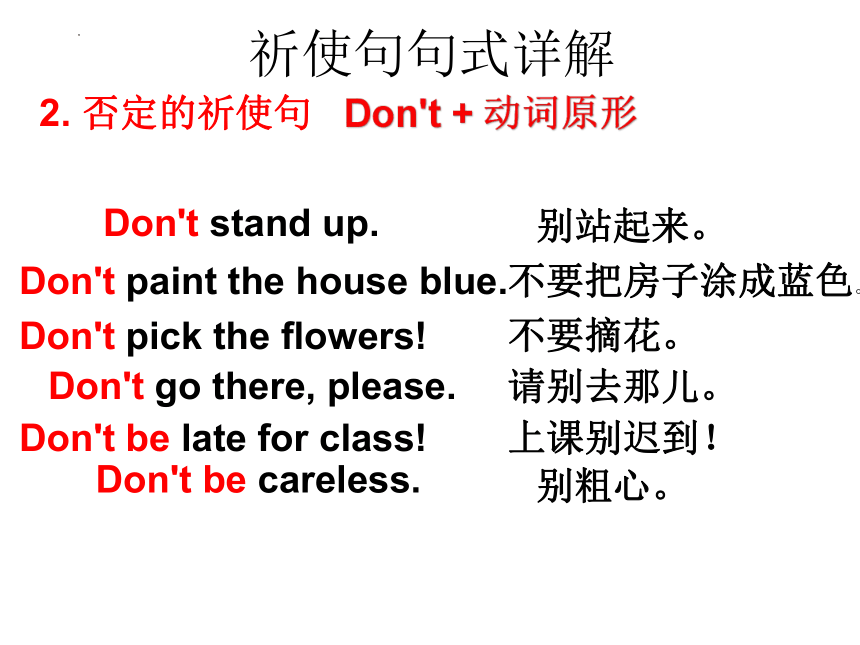

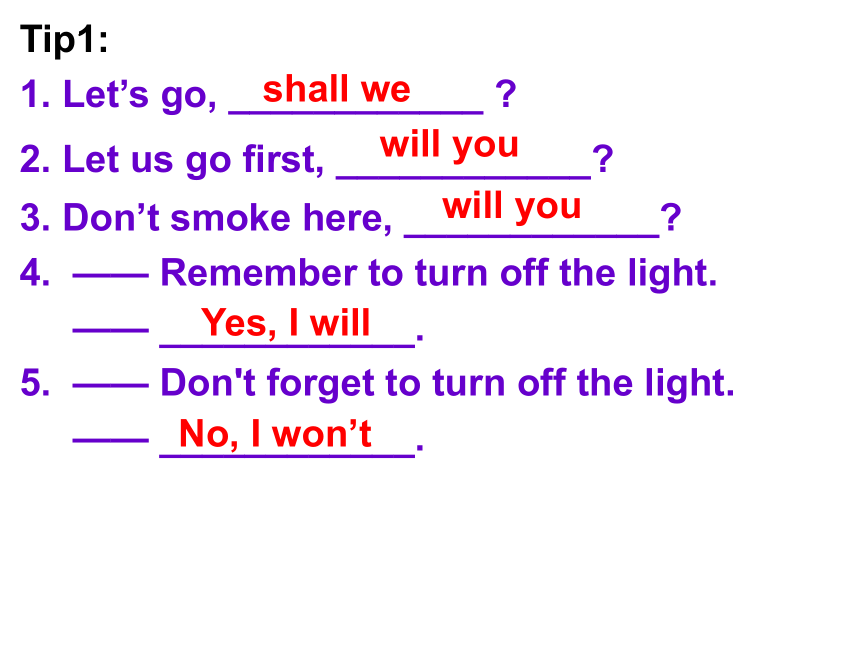
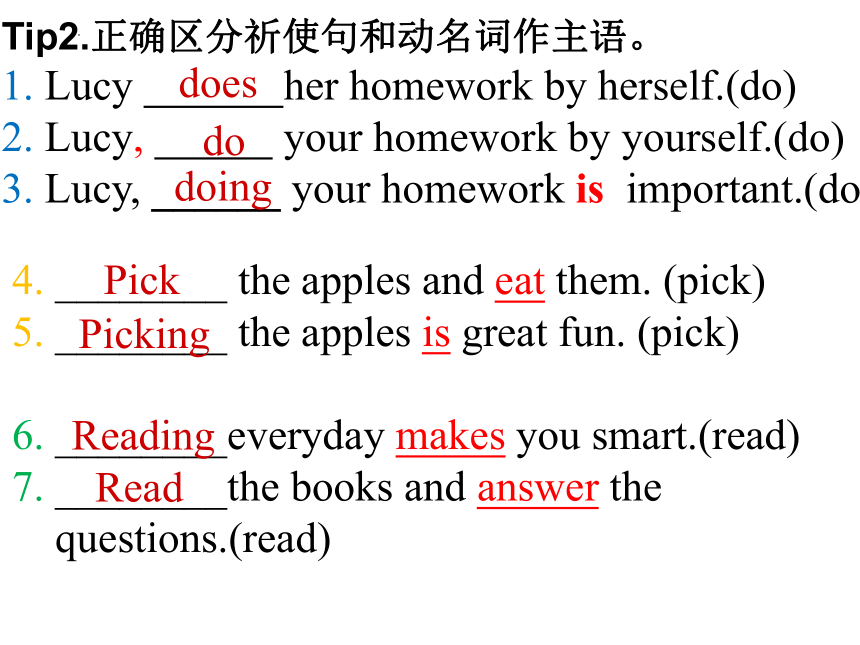
文档简介
(共29张PPT)
Unit 4
Do it yourself
Language in use
Learning Aims
1. Be able to give instructions;
2. Learn to give advice and tell people what we think is right;
3. Use them correctly in your daily life.
Read and think
Turn left! Don’t pick the flowers!
Turn right! Don’t smoke!
Let me help you. Don’t be late again!
Be quiet, please. Don’t park your car!
Please go upstairs! Please don’t eat!
Read the following sentences and tell their meanings.
When do we use these sentences
We use these sentences to give orders or instructions .They are called imperatives.(祈使句)
祈使句的结构如下:
(Please) do sth
(Please) don’t do sth.
肯定:
否定:
祈使句表示请求、命令、建议等等。
谓语动词一律用原形。
句子中通常不用主语,句末用感叹号或者句号。
为使语气委婉礼貌,通常与please连用。
please用在句末时,必须用逗号与其余部分隔开。
Draw the conclusion
祈使句句式详解
1. 肯定的祈使句
(1)动词原形+其他
请起立。
(2) Be + adj.
小心 / 当心!
请安静!
(3) Let型(let sb do sth)
让我试试看。
咱们一起上学去吧。
让我们看看地图。
● let’s是let us的简略式。
Stand up, please.
Be careful!
Be quiet!
Let's go to school together.
Let me try.
Let's look at the map.
祈使句句式详解
2. 否定的祈使句 Don't + 动词原形
Don't stand up.
Don't be careless.
别站起来。
别粗心。
Don't pick the flowers!
不要摘花。
不要把房子涂成蓝色。
Don't paint the house blue.
Don't be late for class!
上课别迟到!
Don't go there, please.
请别去那儿。
3. 在公共场合的提示语中,常用的结构
“No+名词 / v -ing” ,表示“禁止做某事”
No smoking!
No photos!
No parking!
Tip1:
1. Let’s go, ____________
2. Let us go first, ____________
3. Don’t smoke here, ____________
4. —— Remember to turn off the light.
—— ____________.
5. —— Don't forget to turn off the light.
—— ____________.
shall we
will you
will you
No, I won’t
Yes, I will
Tip2.正确区分祈使句和动名词作主语。
1. Lucy her homework by herself.(do)
2. Lucy, your homework by yourself.(do)
3. Lucy, ______ your homework is important.(do)
does
do
doing
4. ________ the apples and eat them. (pick)
5. ________ the apples is great fun. (pick)
6. ________everyday makes you smart.(read)
7. ________the books and answer the
questions.(read)
Pick
Picking
Reading
Read
cut
write
draw
Look at
try
don’t give
Keep
1. Jim, _____ me a hand.
A. gives B. is giving C. will give D. give
2. ____ careful, Jenny! There is a tree in front of you.
A. Am B. / C. Be D. Was
3. Let's ____ our time.
A. not waste B. no wasting
C. not to waste D. no waste
4. —____ higher, and you will see the house.
—OK.
A. If you stand B. To stand
C. When you stand D. Stand
Exercises:
5. Please ___ do it.
A. he B. let him C. let he D. him
6. _____ let anyone open the door.
A. Don't B. Will C. Not D. No
7. —Don’t be late again.
—Sorry, ______.
A. I may B. I must C. I will D. I won’t
8. —Call me when you get home.
—OK, ____.
A. I must B. I can C. I will D. I may
9. Don’t tell him the fact now, _____
A. shall we B. shall you C. will you D. do you
10.Let the children not make so much noise, ____
shall we B. will you C. shall I D. do you
11. Let’s finish the work all by ourselves, ____
A. shall we B. will you
C. do you D. do we
12.Please turn on the light, _____
A. are you B. shall we C. shall I D. will you
13.Andrew had better _______ a course in DIY.
A. to take B. taking
C. to taking D. take
Instructions or Advice
Andrew is not good at DIY, what advice can you give him
He should read more books about DIY.
He had better read more books about DIY.
He should take a course in DIY.
He bad better take a course in DIY.
He should not paint the whole house blue.
He had better not paint the whole house blue.
当我们给他人提建议时,可以用had better和should,表示“最好”或“应该”做某事, had better的语气比should强一些。
你的手表坏了, 你最好买个新的。
Your watch is broken. You had better buy a new one.
你应该对DIY有点了解。
You should know a little about DIY.
(1) had better
(通常简略为’d better)+动词原形
否定形式:had better (not) do sth.
汤姆,你最好今天去那儿。
Tom, you’d better go there today.
你最好不要错过末班公共汽车。
You had better not miss the last bus.
(2) should +动词原形
should 的否定式是should not/shouldn’t。
你应该戒烟。
You should give up smoking.
你不应该看太多电视。
You shouldn’t watch too much TV.
DIY advice
Suzy is giving DIY advice to her classmates. Read the advice below. Help Suzy make sentences with should (not) or had better (not).
a begin your work without reading them
b join a DIY club to learn more about it
c be patient
d buy some to learn more about it
e play with them when you do DIY jobs
1. There are many useful books
about DIY.
You should / had better buy some to learn more about it.
2. DIY is not easy.
You should/ had better join a DIY club to learn more about it.
You shouldn’t / had better not begin your work without reading them.
3. Instructions are important.
You should / had better be careful when you use them.
4. Scissors can be dangerous.
You should/ had better be patient.
5. Sometimes it’ll take time to do a DIY job.
How to be a good student
You _______________________ be late for school.
You _________________ listen carefully in class.
should (not); had better (not)
shouldn’t / had better not
should / had better
Discuss and fill in the blanks.
You _______________________ look out of the window in class.
You _________________ keep your classroom clean.
You _________________ be friendly to others.
You _______________________ talk in class.
should / had better
should / had better
shouldn’t / had better not
shouldn’t / had better not
Any other advice
What should we do in the library
keep the library quiet.
keep the library clean.
read the books carefully.
keep the books clean...
We should / had better:
What shouldn’t we do in the library
make much noise.
write on the books.
talk to your classmates loudly.
take the books out of the library...
We shouldn't/ had better not:
Say our daily life
Can you give the little boy some advice
1. The TV is too loud. Please _______.
A. turn it down B. to turn it down
C. turn down it D. to turn down it
2. _______ late again, Bill!
A. Don't to be B. Don't be
C. Not be D. Be not
3. _______ cross the road until the traffic
lights turn green.
A. Not B. Won't
C. Doesn't D. Don't
4. _______ me the truth, or I'll be angry.
A. Telling B. To tell
C. Told D. Tell
EXERCISES
II. 句型转换。
1. Will you please read it again more slowly
(改为祈使句)
_______ again more slowly, please.
2. If you don't listen to me, I'll go.
(改为同义句)
________ me, or I'll go.
3. The teachers often tell the students not to
be careless. (改为祈使句)
________ careless, please.
4. Please sit next to Nancy. (改为否定句)
________ next to Nancy.
Read it
Listen to
Don't be
Don't sit
III. 完成句子。
1. 你应该在南京换火车。
__________ change trains at Nanjing.
2. 你最好在下雨前回家。
___________________ before the rain
starts.
3. 现在你最好别打棒球了。
_____________________ baseball now.
4. 不要把金鱼放在阳光下。
_________ the goldfish in the sun.
You should
You'd better go home
You had better not play
Don’t put
Unit 4
Do it yourself
Language in use
Learning Aims
1. Be able to give instructions;
2. Learn to give advice and tell people what we think is right;
3. Use them correctly in your daily life.
Read and think
Turn left! Don’t pick the flowers!
Turn right! Don’t smoke!
Let me help you. Don’t be late again!
Be quiet, please. Don’t park your car!
Please go upstairs! Please don’t eat!
Read the following sentences and tell their meanings.
When do we use these sentences
We use these sentences to give orders or instructions .They are called imperatives.(祈使句)
祈使句的结构如下:
(Please) do sth
(Please) don’t do sth.
肯定:
否定:
祈使句表示请求、命令、建议等等。
谓语动词一律用原形。
句子中通常不用主语,句末用感叹号或者句号。
为使语气委婉礼貌,通常与please连用。
please用在句末时,必须用逗号与其余部分隔开。
Draw the conclusion
祈使句句式详解
1. 肯定的祈使句
(1)动词原形+其他
请起立。
(2) Be + adj.
小心 / 当心!
请安静!
(3) Let型(let sb do sth)
让我试试看。
咱们一起上学去吧。
让我们看看地图。
● let’s是let us的简略式。
Stand up, please.
Be careful!
Be quiet!
Let's go to school together.
Let me try.
Let's look at the map.
祈使句句式详解
2. 否定的祈使句 Don't + 动词原形
Don't stand up.
Don't be careless.
别站起来。
别粗心。
Don't pick the flowers!
不要摘花。
不要把房子涂成蓝色。
Don't paint the house blue.
Don't be late for class!
上课别迟到!
Don't go there, please.
请别去那儿。
3. 在公共场合的提示语中,常用的结构
“No+名词 / v -ing” ,表示“禁止做某事”
No smoking!
No photos!
No parking!
Tip1:
1. Let’s go, ____________
2. Let us go first, ____________
3. Don’t smoke here, ____________
4. —— Remember to turn off the light.
—— ____________.
5. —— Don't forget to turn off the light.
—— ____________.
shall we
will you
will you
No, I won’t
Yes, I will
Tip2.正确区分祈使句和动名词作主语。
1. Lucy her homework by herself.(do)
2. Lucy, your homework by yourself.(do)
3. Lucy, ______ your homework is important.(do)
does
do
doing
4. ________ the apples and eat them. (pick)
5. ________ the apples is great fun. (pick)
6. ________everyday makes you smart.(read)
7. ________the books and answer the
questions.(read)
Pick
Picking
Reading
Read
cut
write
draw
Look at
try
don’t give
Keep
1. Jim, _____ me a hand.
A. gives B. is giving C. will give D. give
2. ____ careful, Jenny! There is a tree in front of you.
A. Am B. / C. Be D. Was
3. Let's ____ our time.
A. not waste B. no wasting
C. not to waste D. no waste
4. —____ higher, and you will see the house.
—OK.
A. If you stand B. To stand
C. When you stand D. Stand
Exercises:
5. Please ___ do it.
A. he B. let him C. let he D. him
6. _____ let anyone open the door.
A. Don't B. Will C. Not D. No
7. —Don’t be late again.
—Sorry, ______.
A. I may B. I must C. I will D. I won’t
8. —Call me when you get home.
—OK, ____.
A. I must B. I can C. I will D. I may
9. Don’t tell him the fact now, _____
A. shall we B. shall you C. will you D. do you
10.Let the children not make so much noise, ____
shall we B. will you C. shall I D. do you
11. Let’s finish the work all by ourselves, ____
A. shall we B. will you
C. do you D. do we
12.Please turn on the light, _____
A. are you B. shall we C. shall I D. will you
13.Andrew had better _______ a course in DIY.
A. to take B. taking
C. to taking D. take
Instructions or Advice
Andrew is not good at DIY, what advice can you give him
He should read more books about DIY.
He had better read more books about DIY.
He should take a course in DIY.
He bad better take a course in DIY.
He should not paint the whole house blue.
He had better not paint the whole house blue.
当我们给他人提建议时,可以用had better和should,表示“最好”或“应该”做某事, had better的语气比should强一些。
你的手表坏了, 你最好买个新的。
Your watch is broken. You had better buy a new one.
你应该对DIY有点了解。
You should know a little about DIY.
(1) had better
(通常简略为’d better)+动词原形
否定形式:had better (not) do sth.
汤姆,你最好今天去那儿。
Tom, you’d better go there today.
你最好不要错过末班公共汽车。
You had better not miss the last bus.
(2) should +动词原形
should 的否定式是should not/shouldn’t。
你应该戒烟。
You should give up smoking.
你不应该看太多电视。
You shouldn’t watch too much TV.
DIY advice
Suzy is giving DIY advice to her classmates. Read the advice below. Help Suzy make sentences with should (not) or had better (not).
a begin your work without reading them
b join a DIY club to learn more about it
c be patient
d buy some to learn more about it
e play with them when you do DIY jobs
1. There are many useful books
about DIY.
You should / had better buy some to learn more about it.
2. DIY is not easy.
You should/ had better join a DIY club to learn more about it.
You shouldn’t / had better not begin your work without reading them.
3. Instructions are important.
You should / had better be careful when you use them.
4. Scissors can be dangerous.
You should/ had better be patient.
5. Sometimes it’ll take time to do a DIY job.
How to be a good student
You _______________________ be late for school.
You _________________ listen carefully in class.
should (not); had better (not)
shouldn’t / had better not
should / had better
Discuss and fill in the blanks.
You _______________________ look out of the window in class.
You _________________ keep your classroom clean.
You _________________ be friendly to others.
You _______________________ talk in class.
should / had better
should / had better
shouldn’t / had better not
shouldn’t / had better not
Any other advice
What should we do in the library
keep the library quiet.
keep the library clean.
read the books carefully.
keep the books clean...
We should / had better:
What shouldn’t we do in the library
make much noise.
write on the books.
talk to your classmates loudly.
take the books out of the library...
We shouldn't/ had better not:
Say our daily life
Can you give the little boy some advice
1. The TV is too loud. Please _______.
A. turn it down B. to turn it down
C. turn down it D. to turn down it
2. _______ late again, Bill!
A. Don't to be B. Don't be
C. Not be D. Be not
3. _______ cross the road until the traffic
lights turn green.
A. Not B. Won't
C. Doesn't D. Don't
4. _______ me the truth, or I'll be angry.
A. Telling B. To tell
C. Told D. Tell
EXERCISES
II. 句型转换。
1. Will you please read it again more slowly
(改为祈使句)
_______ again more slowly, please.
2. If you don't listen to me, I'll go.
(改为同义句)
________ me, or I'll go.
3. The teachers often tell the students not to
be careless. (改为祈使句)
________ careless, please.
4. Please sit next to Nancy. (改为否定句)
________ next to Nancy.
Read it
Listen to
Don't be
Don't sit
III. 完成句子。
1. 你应该在南京换火车。
__________ change trains at Nanjing.
2. 你最好在下雨前回家。
___________________ before the rain
starts.
3. 现在你最好别打棒球了。
_____________________ baseball now.
4. 不要把金鱼放在阳光下。
_________ the goldfish in the sun.
You should
You'd better go home
You had better not play
Don’t put
